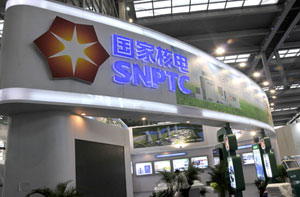Forcing yuan appreciation benefits nobody
Updated: 2011-10-10 14:43
(Xinhua)
|
|||||||||||
BEIJING – When thousands of protesters took to the streets from New York to other US cities last week, launching a grand "Occupy Wall Street" movement for feeling angry over economic injustice, the US Senate made an uproar by proposing a controversial bill instead of addressing its people's urgent cry.
The Senate cleared a procedural vote on Oct 6 to advance a controversial bill, known as the Currency Exchange Rate Oversight Reform Act of 2011, which, if passed, will empower US companies to impose punitive tariffs on goods imported from countries whose currencies they deem "undervalued."
Experts said forcing China to appreciate its currency will not solve US problems, nor will it be constructive to world economic recovery. The intention of some US lawmakers is just to shift the country's domestic contradictions, both in politics and in economy, onto China and its currency.
The move caused strong protest from the Chinese government. Chinese Foreign Ministry spokesman Hong Lei responded that China hopes the United States will refrain from politicizing the exchange rate and trade issues.
Some analysts compared the Senate's move to a patient who wishes others to take medicine to cure his or her own persistent ailment.
Forcing the exchange rate of Chinese currency has become a periodic attack in the United States. Once it was confronted with political and economic pressure domestically, the illness will break out.
Gui Qiangli, an experienced foreign exchange rate analyst in Shihua International Financial Information Co, said some lawmakers aimed to cater for the voters for the upcoming general elections by linking the yuan appreciation to increasing American employment and reducing trade deficit.
However, this has been proven to be a false theory running counter to the facts and trade data over past six years.
Since China began to reform its foreign exchange rate regime in 2005, the renminbi has already appreciated more than 20 percent against the greenback. Yet the US trade deficit with China is still going up and the US jobless rate has remained stubbornly high.
The bill will not help the US create jobs, but will lead to negative results, said the Washington Post on Oct. 3, when the US Senate made its first vote.
"It is a counterproductive bill", said the newspaper in an editorial, adding that punishing China's currency will not balance the US trade and create more jobs.
"Ending the trade deficit with China would not necessarily cure the overall US trade imbalance," the leading US media said. "That's because other low-wage countries....could easily take China's place."
The editorial noted that the components of many "Chinese" goods are already made elsewhere, imported by China for assembly and then re-exported to the United States. Only 20 to 30 percent of the value of Chinese goods in the United States would be affected by a stronger yuan.
Furthermore, China is sticking to its appreciation policy amid the unfolding global debt crisis. The gradual appreciation of the yuan is critical to both maintaining global economic growth, but ensuring the continued growth and stability within its own economy.
The fragile global economic recovery simply cannot afford the risk of an all-out trade war between the world's two largest economies.
"At a time when China is one of the few sources of global growth, ratcheting up protectionist sentiments only makes it harder to secure the necessary multilateral cooperation," Yukon Huang, senior associate at the Washington-based think tank Carnegie Endowment, said on Oct 6.
The Senate move could fall foul of World Trade Organization rules, US President Barack Obama said at a White House press conference after the Senate proposed the vote.
"It's pretty dangerous to be moving legislation through the United States Congress forcing someone to deal with the value of their currency," Republican House Speaker John Boehner said. "Given the economic uncertainty around the world, it's just very dangerous and we should not be engaged in this."
"This is well beyond what Congress ought to be doing, and while I've got concerns about how the Chinese have dealt with their currency, I'm not sure this is the way to fix it," said Boehner.
"Employment is a domestic problem, closely related to salary and structure," said Tan Yalin, an expert at the China Institute for Financial Derivatives at Peking University, "The exchange rate of Chinese currency is not the cause of high unemployment in the United States, and the country should introspect itself."
It's time for the patient to take medicine for himself now.
Related Stories
US bill on China's currency 'does more harm than good' 2011-10-06 08:06
China 'firmly opposes' US Senate's yuan bill 2011-10-06 08:04
Foreign exchange ceiling for individuals may be raised 2011-03-16 09:45
China may raise quota on foreign exchange purchases 2011-03-15 14:49
- Coming soon: Cell phones that do it all
- Car rentals switch up several gears
- Sinopec to buy Canada's Daylight for $2b
- 'Crash' train line back to normal
- China IPOs shrink 40% in Jan-Sept amid bear market
- Xinjiang gets more support in policy
- Rules tightened over banks' products
- Agriculture faces a growing problem













